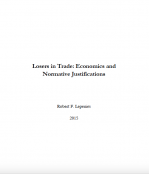
Losers in Trade: Economics and Normative Justifications.
Lepenies, Robert. 2015. PhD Dissertation: “Losers in Trade: Economics and Normative Justifications”. Published with Hertie School of Governance Library.
Should there be free trade? This question finds different, and often
contradicting answers in philosophy and economics. Among economists, there
is a remarkable consensus that free markets are desirable. It is this curious
consensus that motivates this study.
This dissertations aims to explain, reconstruct and contest the neoclassical
vision in mainstream trade theory. It is argued that economic justifications for
free trade policies rely on an array of implicit and explicit normative premises,
and that economists take positions on topics that are usually dealt with by
political philosophers. Taken together, these premises and positions amount to
what will be called the neoclassical vision.
It is argued that throughout the history of economics, economic doctrines
were inescapably normative. Tracing the intellectual and historical origins of
this neoclassical vision, it is shown how a specific view of what justice demands in the economy came to be constitutive of today’s economic arguments. I hence attempt to treat economics today as it has historically been: as a branch of political philosophy, and as inextricably normative.
Normative trade theory and the theoretical arguments put forward by
international economists will serve as the case study on which basis the
neoclassical vision is reconstructed. In turn, the vision will be critically assessed from a liberal egalitarian perspective. Particular attention will be paid to the question of the role of politics in how losers from economic activity are
treated. Following this critical analysis, I argue for the need of a normative ‘countervision’ that is most convincingly provided by John Rawls’s early work. It will then be outlined how Rawls could respond and overcome the pitfalls of the neoclassical vision – even though Rawls is deeply influenced by conventional economic thought himself.